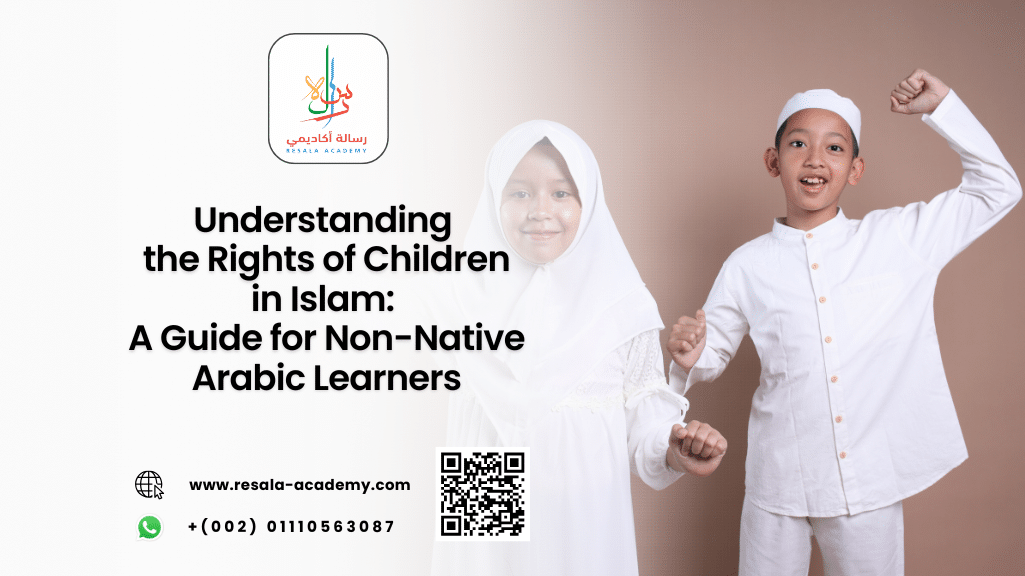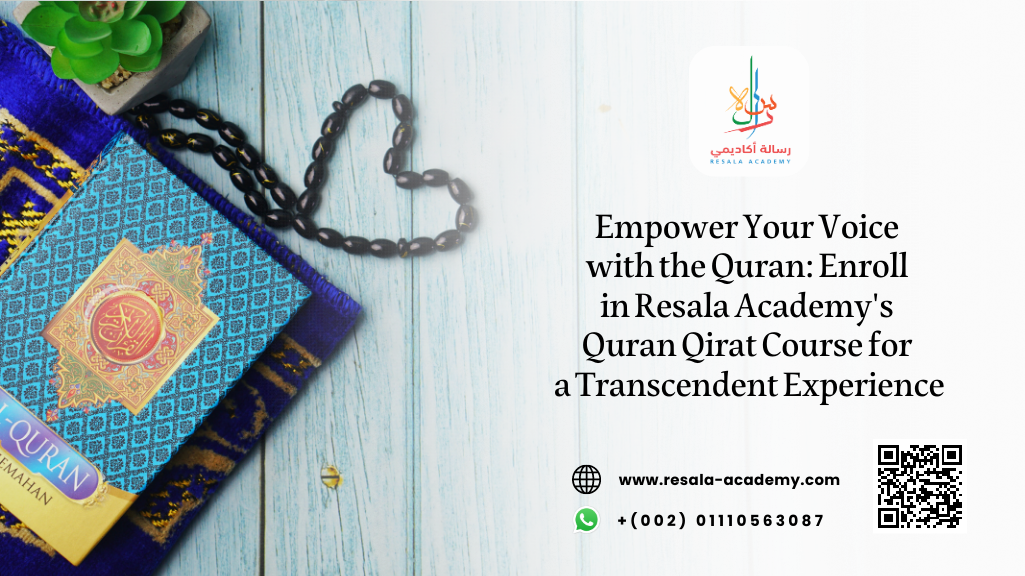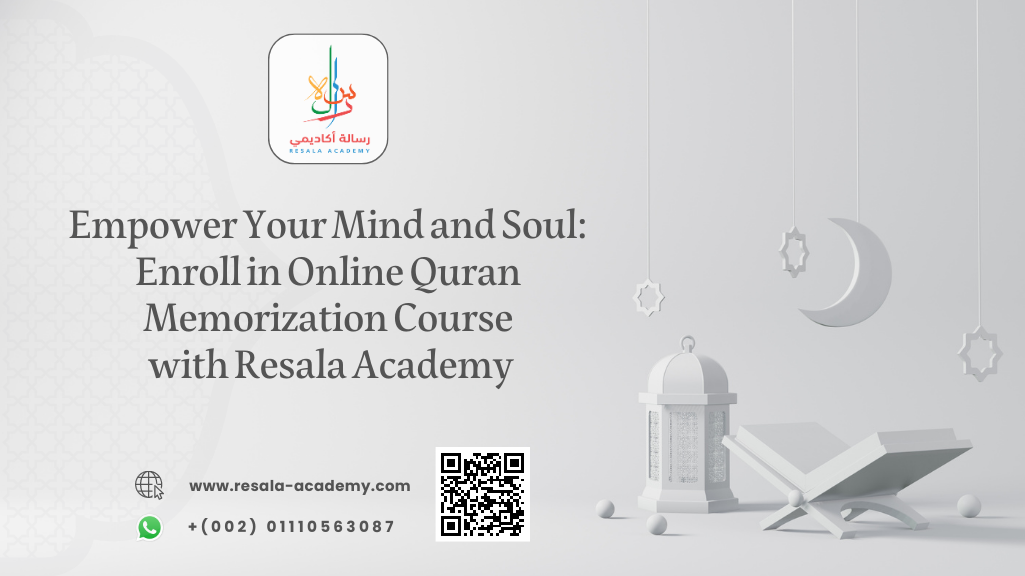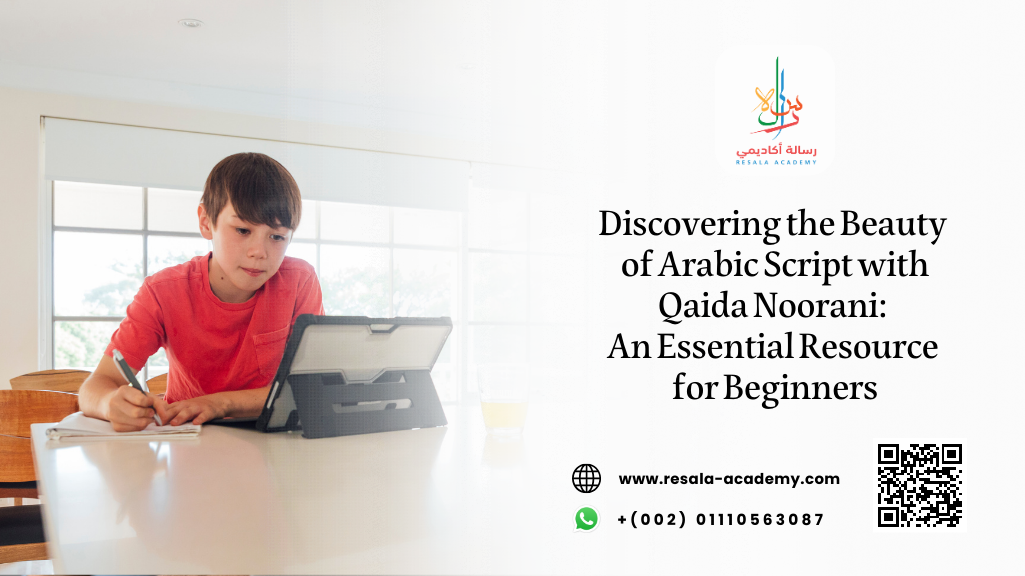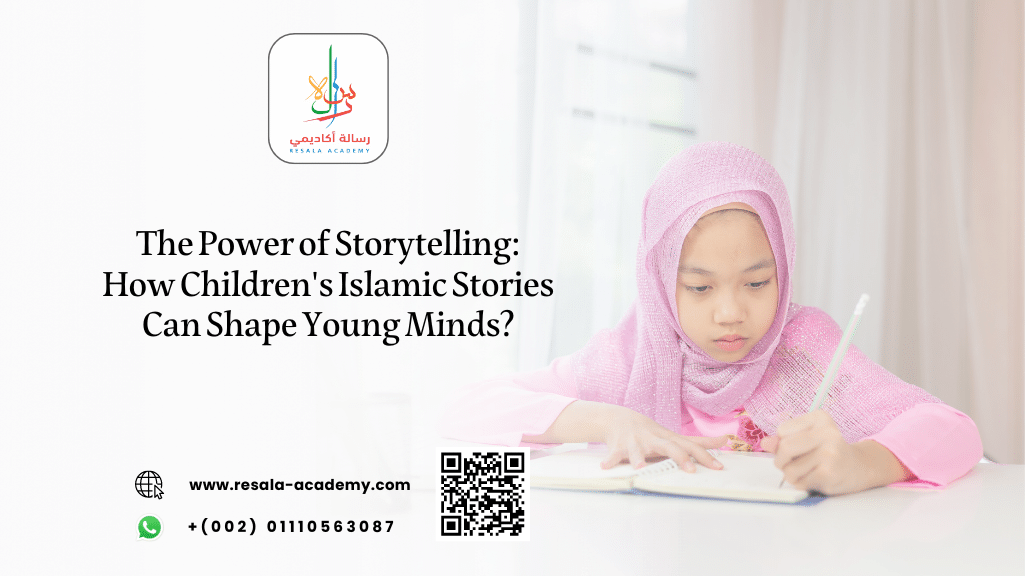Table of Contents
Understanding the Rights of Children in Islam: A Guide for Non-Native Arabic Learners
Islam places great emphasis on justice, compassion, and the preservation of human dignity. Among the most cherished and protected members of society in Islamic teachings are children. For non-native Arabic learners who are exploring the Quran and Islamic studies, understanding the rights of children in Islam is both enlightening and essential.
This guide offers a comprehensive overview of these rights, supported by authentic sources from the Quran and Hadith, while also introducing learners to the linguistic and spiritual beauty of the Arabic language.
Whether you’re a student of Arabic or someone seeking deeper insight into Islamic values, this article will serve as a valuable resource. We’ll also introduce you to Resala Academy, a premier online learning platform that specializes in Arabic and Quranic education for non-native speakers.
The Importance of Children in Islam
Children are considered a divine trust (أمانة – Amanah) in Islam. They are not only a source of joy and love but also a responsibility that parents and society must nurture with care, respect, and justice. The Prophet Muhammad ﷺ emphasized the significance of treating children with kindness, fairness, and compassion.
Quranic Emphasis on Children
The Quran contains numerous verses that highlight the value and rights of children. One such verse is:
وَلَا تَقْتُلُوا أَوْلَادَكُم مِّنْ إِمْلَاقٍ ۖ نَّحْنُ نَرْزُقُهُمْ وَإِيَّاكُمْ ۚ
“Do not kill your children for fear of poverty. We provide for them and for you.”
— Surah Al-An’am 6:151
This verse not only prohibits infanticide but also promotes the idea that children are a source of blessing and provision from Allah.
Key Rights of Children in Islam
Islamic teachings outline several fundamental rights for children. These rights are not only spiritual and emotional but also legal and social.
1. Right to Life and Protection
Islam strictly forbids any form of harm or violence against children. The sanctity of life is paramount.
وَلَا تَقْتُلُوا أَوْلَادَكُمْ خَشْيَةَ إِمْلَاقٍ ۖ نَّحْنُ نَرْزُقُهُمْ وَإِيَّاكُمْ ۚ
“Do not kill your children for fear of poverty. We provide for them and for you.”
— Surah Al-Isra 17:31
This verse reiterates the importance of protecting children from harm, especially due to economic concerns.
2. Right to a Good Name
The Prophet Muhammad ﷺ advised giving children good and meaningful names. A name is part of a child’s identity and has a psychological impact.
إِنَّكُمْ تُدْعَوْنَ يَوْمَ الْقِيَامَةِ بِأَسْمَائِكُمْ وَأَسْمَاءِ آبَائِكُمْ فَأَحْسِنُوا أَسْمَاءَكُمْ
“Indeed, you will be called on the Day of Resurrection by your names and the names of your fathers, so give yourselves good names.”
— Hadith – Abu Dawood 4948
3. Right to Love and Affection
Children have the right to be loved, hugged, and emotionally nurtured. The Prophet ﷺ was known for his affection toward children.
لَيْسَ مِنَّا مَنْ لَمْ يَرْحَمْ صَغِيرَنَا
“He is not one of us who does not show mercy to our young ones…”
— Hadith – Tirmidhi 1919
This Hadith emphasizes emotional nurturing as a core Islamic value.
4. Right to Education
Education is a fundamental right in Islam. Children should be taught both religious and worldly knowledge.
رَبِّ زِدْنِي عِلْمًا
“My Lord, increase me in knowledge.”
— Surah Taha 20:114
This verse underlines the importance of seeking knowledge from a young age.
5. Right to Inheritance
Islamic law ensures that children receive their rightful share of inheritance. This protects their financial future and ensures justice.
يُوصِيكُمُ اللَّهُ فِي أَوْلَادِكُمْ ۖ
“Allah commands you regarding your children’s inheritance…”
— Surah An-Nisa 4:11
Why This Matters to Non-Native Arabic Learners
Understanding the rights of children in Islam offers a window into the ethical and moral framework of the religion. For non-native Arabic learners, this topic is a perfect blend of linguistic, cultural, and spiritual learning.
Benefits of Studying This Topic in Arabic
- Vocabulary Enrichment: Learn key Arabic terms like حقوق الأطفال (Huquq al-Atfal) – Rights of Children.
- Contextual Understanding: Grasp the deeper meanings of Quranic verses in their original language.
- Spiritual Connection: Engage with the Quran and Hadith in the language they were revealed.
Learn Arabic and Islamic Studies with Resala Academy
Resala Academy is a leading online platform dedicated to teaching Arabic and Quran to non-native speakers. With certified instructors, interactive classes, and a curriculum rooted in authentic Islamic sources, Resala Academy is your gateway to mastering Arabic and deepening your understanding of Islam.
Why Choose Resala Academy?
🧑🏫 Native Arab instructors with Ijazah certification
📚 Structured courses for all levels
💻 Flexible online classes
🕌 Quran memorization and Tajweed programs
🌐 Global community of learners
Ready to start your journey? Join Resala Academy today and unlock the beauty of Arabic and the Quran!
Expanding the Framework: Societal Responsibilities Toward Children in Islam
While much of the discourse around the rights of children in Islam centers on parental duties, Islamic teachings also emphasize the broader community’s role in safeguarding these rights.
This holistic approach ensures that children are nurtured not only within their households but also within society at large. For non-native Arabic learners, exploring these concepts deepens both linguistic and ethical understanding.
Community Engagement in Child Welfare
Islam encourages the collective responsibility of the Ummah (community) in ensuring children’s well-being. This includes providing access to education, healthcare, and moral guidance, especially for orphans and vulnerable children.
Support for Orphans and the Needy
The Quran repeatedly highlights the importance of caring for orphans (اليتيم – al-yateem), a vulnerable group whose rights are protected under Islamic law.
فَأَمَّا الْيَتِيمَ فَلَا تَقْهَرْ
“So as for the orphan, do not oppress [him].”
—Surah Ad-Duhaa 93:9
This verse underscores the moral obligation to treat orphans with dignity and compassion, reinforcing the broader societal role in upholding child rights.
Educational Institutions as Guardians of Rights
Islamic schools (madaris) and community centers are seen as extensions of the family unit, tasked with instilling values, teaching the Quran, and nurturing spiritual growth. These institutions serve as vital platforms for implementing Islamic child rights in practice.
Language and Cultural Preservation
Teaching children Arabic and Islamic values ensures the preservation of religious identity. Non-native speakers can appreciate how language plays a key role in transmitting ethical principles, especially when studying terms like “حق الطفل” (child’s right) and “رعاية” (care/protection).
Psychological and Emotional Dimensions of Child Rights in Islam
Beyond legal and educational rights, Islam addresses the emotional and psychological needs of children—an area often overlooked in modern discourse.
This comprehensive view offers non-native learners a nuanced understanding of children’s rights in Islam that extends into mental and emotional well-being.
Emphasis on Emotional Intelligence
The Prophet Muhammad ﷺ demonstrated high emotional intelligence in his interactions with children. He would kneel to their level, listen attentively, and validate their feelings—practices that modern psychology now recognizes as essential for child development.
Encouragement Without Harshness
Islamic parenting discourages verbal or physical abuse. Instead, it promotes gentle correction and encouragement. The Prophet ﷺ said:
يَا عَائِشَةُ إِنَّ اللَّهَ رَفِيقٌ يُحِبُّ الرِّفْقَ وَيُعْطِي عَلَى الرِّفْقِ مَا لاَ يُعْطِي عَلَى الْعُنْفِ وَمَا لاَ يُعْطِي عَلَى مَا سِوَاهُ“’A’isha, verily Allah is kind and He loves kindness and confers upon kindness which he does not confer upon severity and does not confer upon anything else besides it (kindness).”
—Sahih Muslim 2593
This Hadith supports the idea that nurturing environments are a right, not a privilege, for every child.
Spiritual Nurturing as a Right
Teaching children to pray, read the Quran, and understand Islamic values is not merely a religious duty—it is a right that ensures their spiritual well-being. This aligns with the concept of tarbiyah (comprehensive upbringing), which includes moral, emotional, and spiritual development.
Identity Formation Through Language
Learning Arabic helps children connect with their faith on a deeper level. For non-native learners, understanding how language shapes identity and spiritual connection is crucial. Terms like “الهوية الإسلامية” (Islamic identity) and “تنشئة إيمانية” (faith-based upbringing) highlight the depth of this right.
By exploring these advanced dimensions of the rights of children in Islam, learners not only gain insight into Islamic ethics but also enrich their Arabic vocabulary and cultural understanding—making their educational journey both meaningful and transformative.
Real-Life Examples from the Prophet’s Life
The life of Prophet Muhammad ﷺ is filled with examples of how he treated children with love, respect, and dignity.
Example 1: Kissing His Grandchildren
The Prophet ﷺ kissed his grandsons, Hasan and Husayn. When a man saw this and commented that he had ten children but never kissed them, the Prophet responded:
مَنْ لاَ يَرْحَمُ لاَ يُرْحَمُ
“He who does not show mercy will not be shown mercy.”
— Hadith – Bukhari 5997
Example 2: Shortening Prayer for a Crying Child
Once, the Prophet ﷺ shortened his prayer upon hearing a child cry, out of concern for the mother.
إِنِّي لأَدْخُلُ فِي الصَّلاَةِ فَأُرِيدُ إِطَالَتَهَا، فَأَسْمَعُ بُكَاءَ الصَّبِيِّ، فَأَتَجَوَّزُ مِمَّا أَعْلَمُ مِنْ شِدَّةِ وَجْدِ أُمِّهِ مِنْ بُكَائِهِ
“Whenever I start the prayer I intend to prolong it, but on hearing the cries of a child, I cut short the prayer because I know that the cries of the child will incite its mother’s passions.”
— Hadith – Bukhari 710
These examples reflect the Prophet’s empathy and the high regard Islam holds for children.
Arabic Terms Every Learner Should Know
Arabic Term | English Meaning | Usage in Context |
حقوق الأطفال (Huquq al-Atfal) | Rights of children | Discussing Islamic child rights |
رحمة (Rahmah) | Mercy | Describing the Prophet’s treatment of children |
علم (Ilm) | Knowledge | Refers to the right to education |
عدل (Adl) | Justice | Ensuring fairness in inheritance |
أمانة (Amanah) | Trust | Children as a divine trust |
Discover why teaching your child to read Surah Yaseen early can nurture faith, focus, and love for the Quran—explore the powerful benefits for non-Arabic speakers now!
Your Journey Begins Here: Enroll with Resala Academy
Are you ready to explore the beauty of the Arabic language and the depth of Islamic teachings? Whether you’re a beginner or an advanced learner, Resala Academy offers a personalized learning path to help you achieve fluency and spiritual growth.
With courses in:
- Quranic Arabic
- Tajweed and Quran memorization
- Islamic Studies for non-native speakers
- Conversational Arabic
Resala Academy is your trusted partner in this sacred journey. Don’t just learn Arabic—live it, understand it, and connect with the divine message.
Enroll now and take your first step toward mastering Arabic and understanding Islam like never before.
Frequently Asked Questions (FAQs)
1. Why are children’s rights emphasized so much in Islam?
Islam views children as a trust from Allah. Their well-being is a communal and parental responsibility. The emphasis ensures their physical, emotional, and spiritual development in a just and loving environment.
2. How can non-native speakers understand Quranic verses about children?
By enrolling in programs like those offered by Resala Academy, learners can study the Quran with expert guidance, learn vocabulary, and understand the context of each verse in Arabic and English.
3. Are there specific Hadiths about treating children kindly?
Yes. The Prophet ﷺ said:
“He is not one of us who does not show mercy to our young ones…”
—Tirmidhi 1919
This Hadith underscores the importance of compassion.
4. Can I learn Arabic and Islamic studies online effectively?
Absolutely. Platforms like Resala Academy offer structured, interactive, and flexible online courses tailored for non-native speakers.
5. What are the most important Arabic words to learn when studying child rights in Islam?
Some essential words include:
- حقوق (Rights)
- أطفال (Children)
- رحمة (Mercy)
- علم (Knowledge)
- عدل (Justice)
These terms frequently appear in Quranic and Hadith texts related to children.
Conclusion
The rights of children in Islam are a testament to the religion’s emphasis on justice, mercy, and human dignity. From the right to life and education to emotional nurturing and inheritance, Islam offers a comprehensive framework that safeguards the well-being of children.
For non-native Arabic learners, studying these rights is more than an academic pursuit—it’s a spiritual journey that connects the heart with the divine wisdom of the Quran and the Sunnah. Through platforms like Resala Academy, learners can gain authentic knowledge, master the Arabic language, and deepen their understanding of Islam.
Let this be your invitation to explore, learn, and grow. The journey of a thousand miles begins with a single step—take that step today with Resala Academy.
